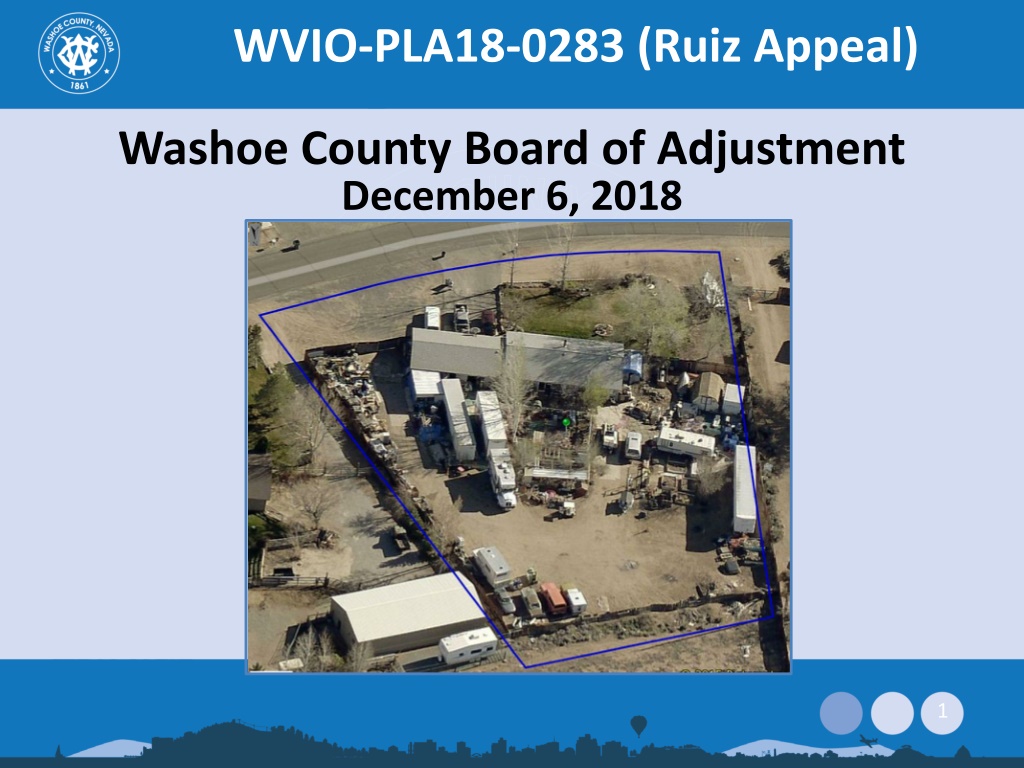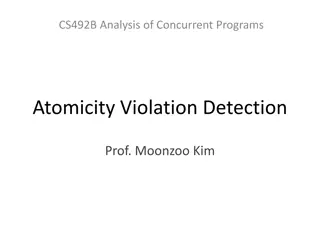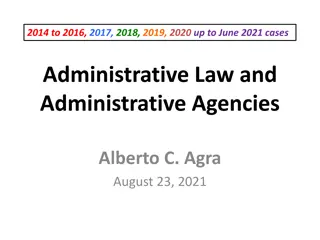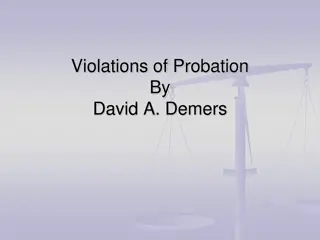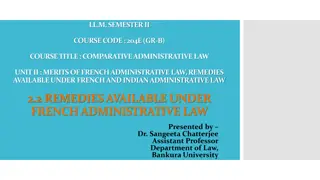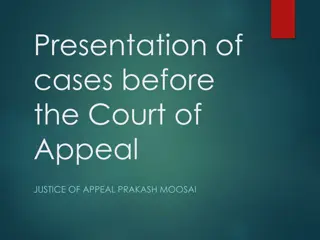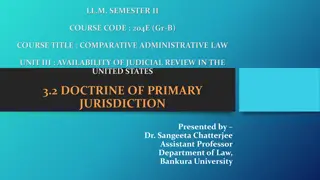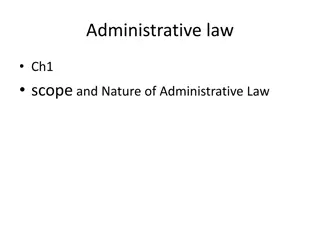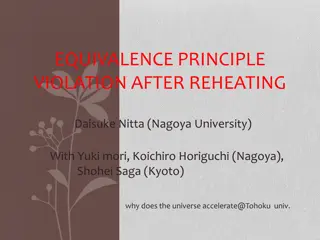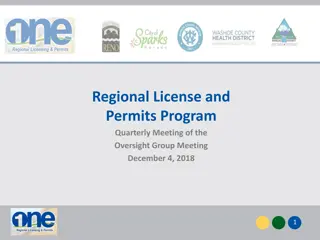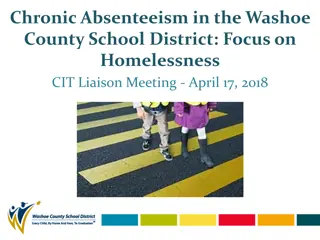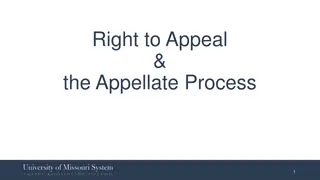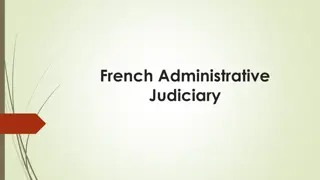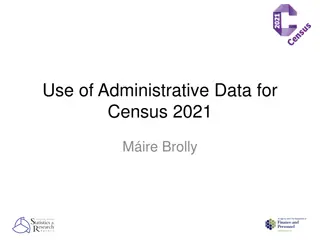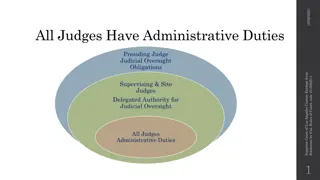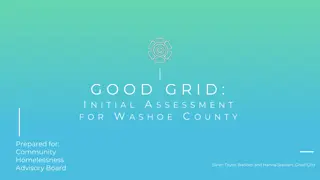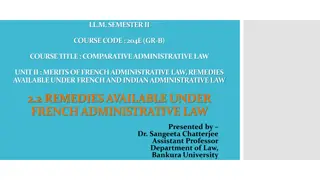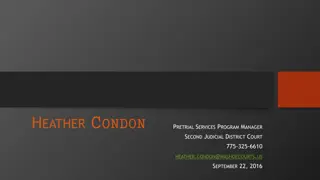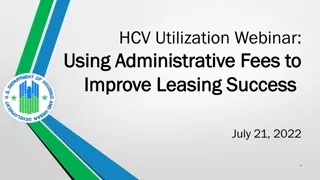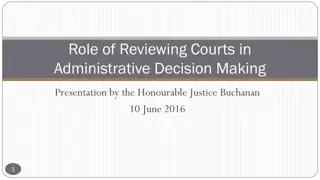Appeal of Administrative Decision on Violation of Washoe County Code
Property owner appealing violation findings under Washoe County Code for outdoor storage of commercial vehicles on residential property. Case involves enforcement procedures, penalties, and administrative hearing officer's decision.
Download Presentation

Please find below an Image/Link to download the presentation.
The content on the website is provided AS IS for your information and personal use only. It may not be sold, licensed, or shared on other websites without obtaining consent from the author. Download presentation by click this link. If you encounter any issues during the download, it is possible that the publisher has removed the file from their server.
E N D
Presentation Transcript
WVIO-PLA18-0283 (Ruiz Appeal) Washoe County Board of Adjustment December 6, 2018 1
Background/Overview Appeal of an administrative hearing officer s decision What does that mean? A property owner has been found in violation of Washoe County Code (WCC) by both code enforcement (CEO) staff and an administrative hearing officer; and, The property owner has appealed these findings per WCC Chapter 125, Administrative Enforcement Code First such case to be heard by the Board of Adjustment (BOA) since adoption of WCC Chapter 125 2
Background/Overview Anonymous complaint received June 26, 2018 alleging the following was occurring at 115 Virgil Drive: 1. That a mechanic shop was being run from the home; 2. Commercial vehicles were being stored on the property 3. Junk vehicles were also being stored on the property Upon investigation, the CEO confirmed that a commercial vehicle was visibly stored on the property But no illegal business activity or junk vehicle violations were observed 4
Background/Overview Violation of WCC 110.306.35(c), Outdoor storage of commercial vehicle(s) on a residentially zoned property Enforcement per WCC Chapter 125, Administrative Enforcement Code enabled by 110.910.15(d) Administrative enforcement procedures include a process for warnings and then escalating penalties if a violation is not corrected Issuance of an administrative warning is the first step in the enforcement process 30 days to correct violation (or agree to a compliance plan) 7
Background/Overview Property owner did not contact CEO staff after receipt of the administrative warning notice Due to lack of contact and no correction after 30 days, a penalty notice was issued ($100 fine) Per WCC Section 125.240, a respondent may appeal an administrative penalty notice Appeal is a request for a hearing by an administrative hearing officer (and is in lieu of paying the penalty) Not a hearing examiner 8
Background/Overview Appeal request stays enforcement proceedings until the hearing officer renders a decision Administrative hearing officer decides, based on the evidence presented and testimony provided: 1. If a violation of WCC occurred as alleged by the code enforcement officer; and, 2. The remedy (method of correction, assessment of penalty, dismissal, remand, etc.) 9
Background/Overview Appeal was heard on September 19, 2018 Hearing include presentation of arguments and evidence by both sides (see Exhibit A, Record on Appeal) Hearing officer found that a violation of WCC Section 110.306.35(c) had occurred Issued an Administrative Order requiring the commercial vehicle to be removed no later than December 1, 2018 (but waived the $100 penalty) 10
Background/Overview WCC Section 110.910.15(d) Administrative Enforcement Proceedings provides the following appeal rights (under a WCC Chapter 125 enforcement action/proceeding): 1) Appeal to Board of Adjustment. Any aggrieved person may appeal a decision or order of an administrative hearing officer to the Board of Adjustment in accordance with the Rules of the Board of Adjustment. 11
Background/Overview BOA review considerations on such appeals are outlined on pages 4 and 5 of the staff report BOA tasked with affirming, modifying, reversing, or remanding the administrative hearing officer s decision May consider the record on appeal (Exhibit A), evidence presented by the appellant, testimony received at the public hearing, and any other evidence deemed relevant by the BOA BOA decision is final for purposes of judicial review no appeal to BCC; 25 days to file court petition 12
Analysis WCC Section 110.306.35(c) states that no storage of commercial vehicles shall be allowed on any residentially zoned parcel, unless specifically regulated in another section of the code The 1 acre property is zoned LDS classified as a residentially zoned property The subject vehicle is a commercial vehicle based on the definition provided by WCC 110.306.35(c)(1) Exceptions to the storage of commercial vehicles not applicable 13
Analysis 14
Analysis The subject vehicle meets the definition of a commercial vehicle in three ways: 1. The vehicle was originally manufactured and designed as a commercial vehicle; 2. The vehicle has more than two axles on the road (see pictures included with Tab 1 of Exhibit A); and 3. The vehicle exceeds 8,000 pounds gross unladen weight (see the 2017n vehicle registration included within Tab 1 of Exhibit A, or Exhibit C) 15
Analysis The appellant has argued that the subject vehicle has been converted to a Recreational Vehicle (RV); and, Therefore qualifies for the exemption provided by WCC Section 110.306.35(d)(4) which states: Registered recreational vehicles and campers and items typically associated with and used for personal outdoor recreation. Examples of recreational vehicles and items include, but are not limited to, motorized campers, fifth wheel campers and camper trailers, boats and personal watercraft, and motorcycles 16
Analysis The vehicle is registered by the DMV as a Truck Motor Home RV conversion; however, The DMV registration process only verifies that all components of a RV are in place (e.g. grey water holding tank, toilet, sink, sleeping area, etc.) Registration by the DMV is irrelevant to the requirements/definitions of the Development Code CEO staff interprets the RV exception to apply only to vehicles designed and constructed as a RV, and not to vehicles converted from a commercial vehicle 17
Analysis CEO position is that a vehicle remains classified as it originated from the factory regardless of any subsequent modifications (+ other def. provisions) The appellant has also argued that in other enforcement cases, the hearing officer did find that a RV conversion was not a commercial vehicle Hearing officer decisions are not precedent setting - there are often conflicting decisions / outcomes Staff did not agree with that decision and believes it was not based on a valid interpretation of the code 18
Public Notice and CAB Public notice is not required as part of an administrative enforcement action Only noticing requirement is to notice the violator / appellant and provide due process The appellant has been provided notice and due process as required by Chapter 125 CAB review and/or input is not part of an administrative enforcement action 19
Reviewing Agencies No other agencies have been involved in this administrative enforcement action 20
Findings The BOA is not required to make specific findings in reaching a decision on this appeal Public record is sufficient A written order of the BOA s decision will be prepared, executed by the BOA Chair, and filed with the Secretary of the BOA A copy of the order is served on the appellant If the appeal is denied, the BOA should include in the written order / decision a compliance plan (e.g. remove the vehicle by x date) 21
Possible Motion I move that, after giving reasoned consideration to the information contained in the staff report and information received during the public hearing, the Washoe County Board of Adjustment deny this appeal and uphold the decision of the administrative hearing officer that the appellant violated WCC Section 110.306.35(c), Outdoor storage of commercial vehicle(s) on a residentially zoned property; and, authorize the Chair of the Board of Adjustment to prepare a written order of the decision and file it with the Secretary of the Board of Adjustment, a copy of which shall be served to the appellant. 22
Appeal Process The appellant has the right to appeal the written order by filing a petition for judicial review in the Second Judicial District Court for the State of Nevada within 25 days from the date the order is mailed to the appellant. Per WCC Section 110.910.15(i)(6), when a petition for judicial review is filed, the court rules shall govern the proceeding and the requested judicial review is in lieu of an appeal to the Board of County Commissioners as authorized by NRS 278.310(3)(b). 23
